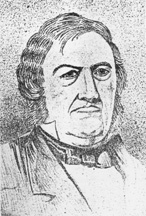Thomas Morris (Ohio politician)
Thomas Morris | |
|---|---|
 | |
| United States Senator from Ohio | |
| In office March 4, 1833 – March 3, 1839 | |
| Preceded by | Benjamin Ruggles |
| Succeeded by | Benjamin Tappan |
| Personal details | |
| Born | January 3, 1776 Berks County, Pennsylvania, U.S. |
| Died | December 7, 1844 (aged 68) Bethel, Ohio, U.S. |
| Political party | Democratic-Republican (Before 1825) Jacksonian (1825–1838) Democratic (1838–1844) Liberty (1844) |
Thomas Morris (January 3, 1776 – December 7, 1844) was an American politician from Ohio who served in the United States Senate and was a member of the Democratic Party. In the 1844 presidential election, he was the vice presidential nominee of the anti-slavery Liberty Party.
Biography
[edit]Morris was born in Berks County, Pennsylvania, and enlisted as a Ranger to fight the Indians in 1793. He settled in western Ohio two years later. Morris began practicing law in Bethel, Ohio in 1804.
Career
[edit]On May 12, 1806, shortly after the beginning of the 1806–1807 term of the Ohio House of Representatives, Morris contested the election of David C. Bryan and was awarded the seat from Clermont County.[1]
Morris served in the Ohio State House of Representatives for Clermont County in 1806–1807, 1808–1809, 1810–1811, and 1820–1821.[2] He served as Justice of the Ohio State Supreme Court in 1809. He was then a member of the Ohio State Senate for Clermont County in 1813–1815, 1821–1823, 1825–1829 and 1831–1833.
He was elected to the U.S. Senate in 1833, and served a single term.[3] He did not seek re-election. He was nominated to the Vice Presidency by the Liberty Party in 1844 under James G. Birney. The ticket came in third after Democratic candidate James Knox Polk and Whig Party candidate Henry Clay.
Family life
[edit]Morris was the father of Isaac Newton Morris and Jonathan David Morris.[4]
Death
[edit]He died December 7, 1844.
Legacy
[edit]Author and prominent American Civil War historian Eric Foner argues in his seminal book Free Soil, Free Labor, Free Men that Sen. Morris is one of the most significant figures in the anti-slavery movement and the "first political martyr of the anti-slavery cause when he was denied re-election to the Senate because of his abolitionist convictions."[5] He also argues that Morris "awakened (Salmon Chase) to the character of the Slave Power and to the need for political organization to combat its influences," leading the way for the term Slave Power to enter the American political jargon and paving the way for the creation of the Republican Party.[5]
References
[edit]- ^ Taylor, William A. (1899). Ohio Statesmen and Annals of Progress, from the Year 1788 to the Year 1900. Columbus, Ohio: Westbote. pp. v. 1, p. 50.
- ^ Gilkey, Elliot Howard (1901). The Ohio Hundred Year Book. Columbus, Ohio: Fred J. Heer. pp. 186–192.
- ^ "Sen. Thomas Morris". Civic Impulse, LLC. Retrieved August 24, 2012.
- ^ "Tolleson, Arizona". Biographical Directory of the United States Congress. Retrieved August 24, 2012.
- ^ a b Foner, Eric; Frank and Virginia Williams Collection of Lincolniana (Mississippi State University. Libraries) (1970). Free soil, free labor, free men: the ideology of the Republican Party before the Civil War. New York: Oxford University Press. ISBN 9780195013528. OCLC 67628.
Further reading
[edit]External links
[edit]- United States Congress. "Thomas Morris (id: M000989)". Biographical Directory of the United States Congress.
- Thomas Morris at Find a Grave
- Benjamin Franklin Morris, The Life of Thomas Morris: Pioneer and Long a Legislator of Ohio, and U. S. Senator from 1833 to 1839 (Cincinnati, Ohio: Moore, Wilstach, Keys & Overend, 1856).
- 1776 births
- 1844 deaths
- Politicians from Berks County, Pennsylvania
- Ohio Democratic-Republicans
- Ohio Jacksonians
- Jacksonian United States senators from Ohio
- Democratic Party United States senators from Ohio
- Ohio Libertyites
- Liberty Party (United States, 1840) vice presidential nominees
- 1844 United States vice-presidential candidates
- Democratic Party members of the Ohio House of Representatives
- Democratic Party Ohio state senators
- Justices of the Ohio Supreme Court
- People from Bethel, Ohio

